When it comes to maintaining our overall wellness, gut health stands out as a cornerstone of vitality. Many of us have heard about probiotics, but what exactly makes them integral to gut health? For health-conscious adults like you, seeking trusted and science-backed wellness solutions, understanding the best probiotics for gut health goes beyond catchy marketing—it’s about selecting supplements that truly support digestion, immune function, and even mental well-being.
In this detailed guide, I’ll walk you through the essentials: what gut microbiome balance means, why probiotics matter, and how to choose the best products on the market. Then, we’ll dive deep into reviews of the top 10 probiotic supplements specifically chosen for their quality, potency, and targeted benefits. You’ll find actionable tips to incorporate probiotics into your daily routine and insights into personalized microbiome testing. By the end, you’ll be equipped with real knowledge to make an informed choice and elevate your wellness journey.
Let’s begin by unraveling the science that underpins probiotic benefits and how they harmonize with your gut health.
Understanding Gut Health and the Role of Probiotics
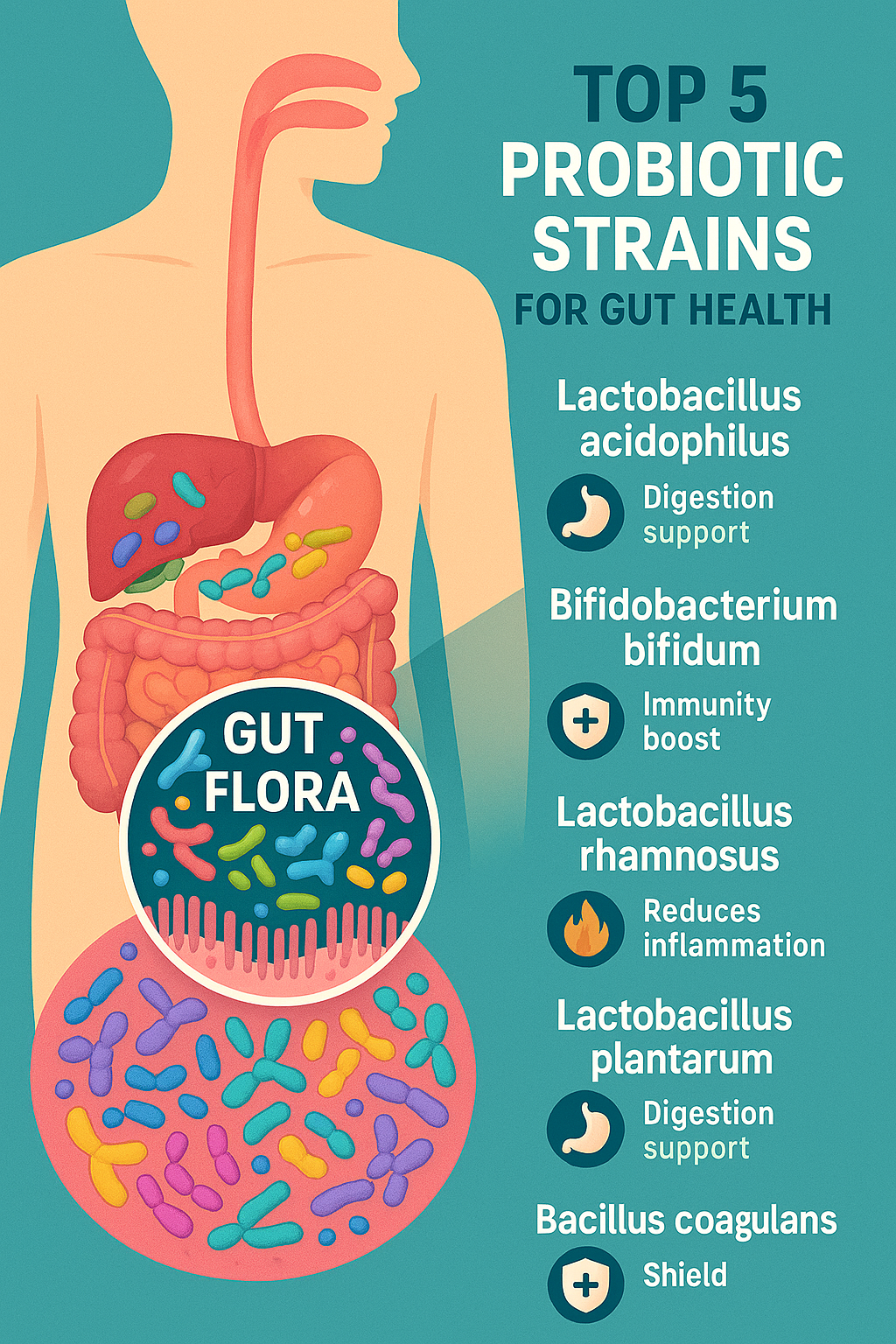
What Is Gut Microbiome Balance?
Imagine your gut as a bustling metropolis inhabited by trillions of microscopic residents—bacteria, yeasts, and other microbes collectively known as the gut microbiome. This community plays vital roles in digesting food, synthesizing certain vitamins, training your immune system, and even communicating with your brain via the gut-brain axis.
A balanced gut microbiome means a diverse and stable population of beneficial bacteria thriving while harmful microbes are kept in check. When this equilibrium is disrupted—due to factors like stress, poor diet, antibiotic use, or infections—it can lead to digestive discomfort, inflammation, and susceptibility to illness.
Researchers now recognize that gut microbiome imbalance can influence far more than digestion; it’s linked to conditions such as leaky gut syndrome, autoimmune diseases, mood disorders, and obesity. Therefore, nurturing this microbial ecosystem is essential for comprehensive health.
How Probiotics Support Digestive Health and Immune Function
Probiotics are live microorganisms that, when administered in adequate amounts, confer health benefits to the host. They predominantly consist of strains from Lactobacillus and Bifidobacterium species but may also include others like Streptococcus and Saccharomyces yeast varieties.
When you consume probiotics—whether through foods like yogurt, kefir, or supplements—they help restore and enhance the gut’s natural flora. Here’s how they benefit the gut and beyond:
-
Digestive Support: Probiotics aid in breaking down food, synthesizing enzymes, and improving nutrient absorption. They also help prevent or alleviate diarrhea, irritable bowel syndrome (IBS), and bloating.
-
Immune Boosting: About 70% of the immune system resides in the gut. Probiotics stimulate immune cells and produce substances that inhibit pathogens, reducing infection risks.
-
Gut Barrier Strength: Probiotics enhance the integrity of the intestinal lining, preventing harmful substances from passing into the bloodstream.
-
Inflammation Reduction: By balancing pro- and anti-inflammatory responses, probiotics can mitigate intestinal inflammation.
-
Gut-Brain Communication: They influence neurotransmitter production and the hormonal axis, potentially improving mood and cognitive function.
The effectiveness of probiotics depends on the strains used, their viability, dosage, and compounds that support their growth—such as prebiotics.
Criteria for Selecting the Best Probiotics for Gut Health
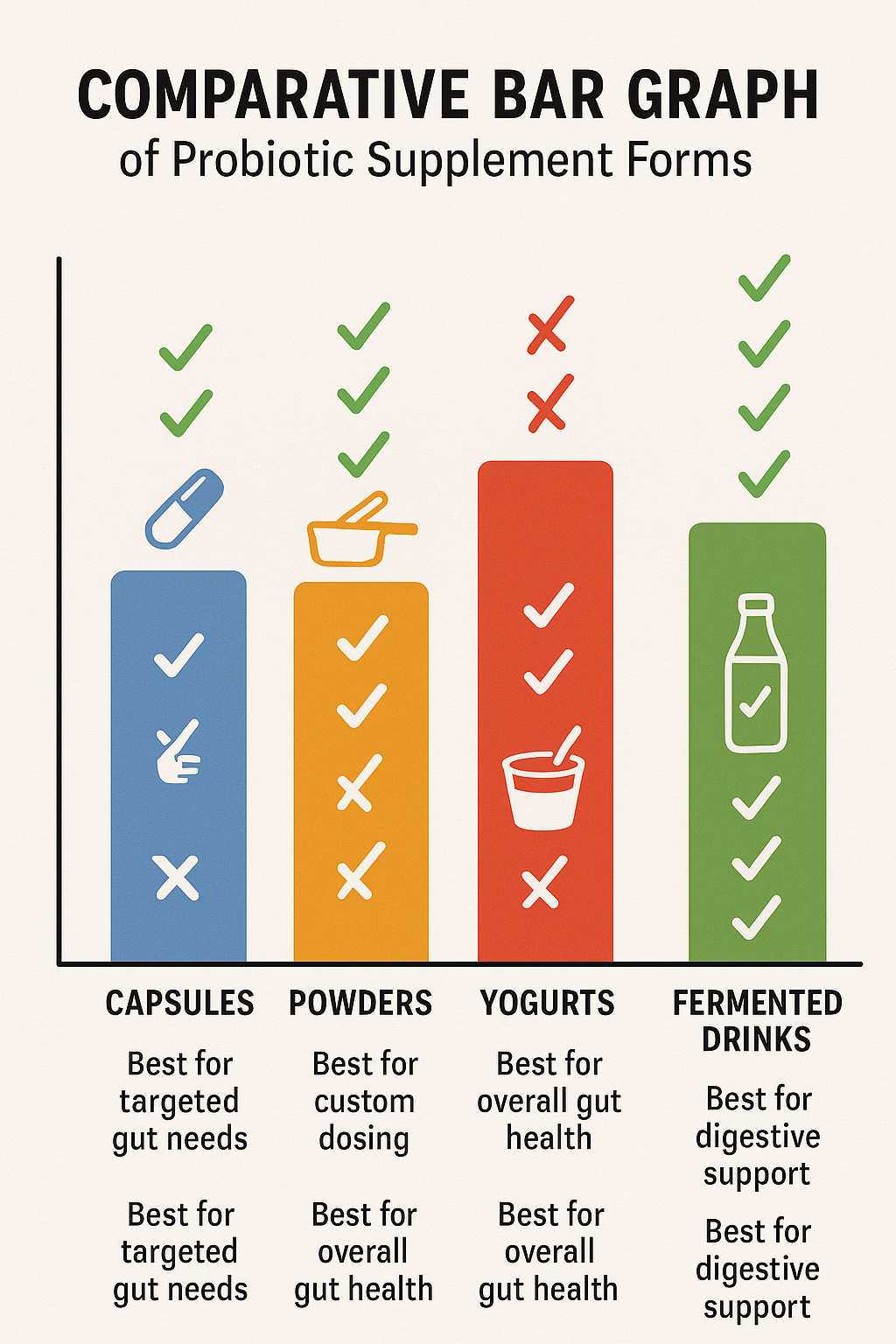
Choosing a probiotic supplement can be overwhelming given the myriad products available. Let’s break down key factors to consider to find what works best for you.
Importance of Probiotic Strains and Species
Not all probiotics are created equal. Different strains offer different benefits. For example:
-
Lactobacillus rhamnosus GG is renowned for supporting digestive health and preventing antibiotic-associated diarrhea.
-
Bifidobacterium lactis can improve immune response and bowel regularity.
-
Lactobacillus plantarum is noted for reducing bloating and supporting the gut barrier.
You’ll want to look for products that disclose the specific strains included and clinical evidence backing their use. Multi-strain probiotics that combine complementary bacteria may offer broader benefits.
Colony-Forming Units (CFUs): How Much Is Enough?
CFU denotes the number of viable probiotic cells in each serving. Dosages vary widely from a billion to over 50 billion CFUs per dose. The right amount depends on your health goals:
-
For general digestive health, 1-10 billion CFU daily is typically sufficient.
-
Higher doses, such as 50 billion CFU, may be recommended for more severe gut imbalances or immune support.
-
Remember, more CFUs don’t always mean better effects; quality and survival matter.
The Role of Prebiotics, Digestive Enzymes, and Additional Ingredients
Prebiotics are nondigestible fibers that act as food for beneficial bacteria, promoting their growth and activity. Many top probiotics include prebiotic fibers such as inulin or fructooligosaccharides (FOS) to enhance colonization.
Some formulations also integrate digestive enzymes to help break down food, aiding those with enzyme deficiencies or digestive issues.
Additional ingredients like polyphenols, vitamins, or minerals can provide synergistic effects but ensure they don’t contain allergens or fillers.
Shelf-Stability, Storage, and Expiration Considerations
Probiotic viability is sensitive to environmental conditions. Look for probiotics that are shelf-stable (requiring no refrigeration), especially if convenience and travel are factors.
Check expiration dates for potency assurance and storage instructions. Some products employ advanced technologies to protect microbes from heat and moisture, extending shelf life.
Avoiding Additives, Fillers, and Misleading Claims
Choose probiotics free from unnecessary additives, artificial colors, preservatives, or allergens. Verify that claims such as “natural,” “clinically proven,” and “shelf-stable” are backed by credible sources.
Detailed Reviews of the 10 Best Probiotics for Gut Health
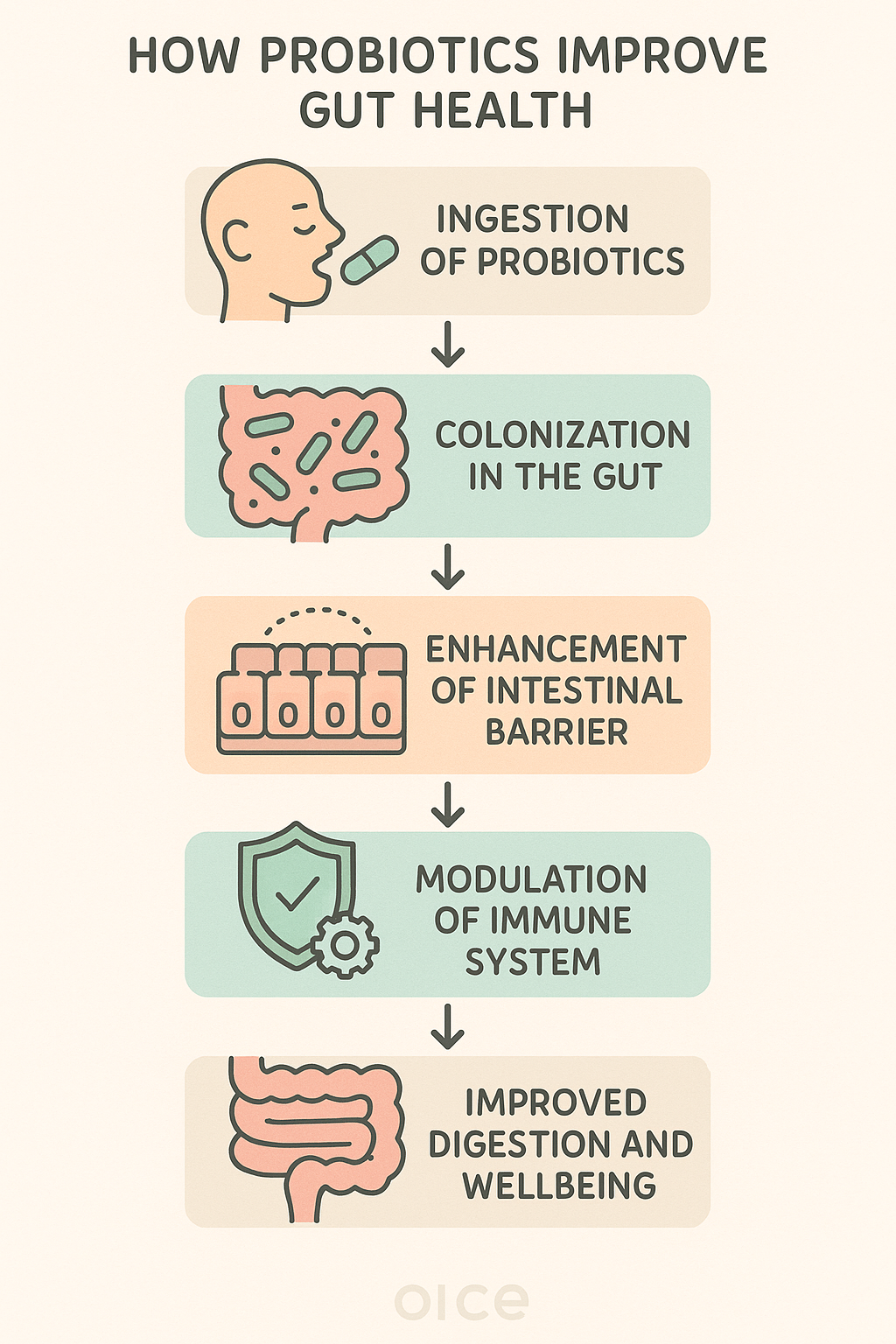
Below are thorough reviews of the top probiotic supplements, complete with features, benefits, pricing, and purchase options. Each is selected for its trusted formulation and suitability for health-conscious adults seeking to optimize gut wellness.
1. Garden of Life Dr. Formulated Probiotics Once Daily Women’s
Key Features and Targeted Benefits
Formulated specifically for women’s gut and vaginal health, this supplement boasts 50 billion CFU per capsule from 16 diverse probiotic strains, including Lactobacillus reuteri and Lactobacillus fermentum. These strains are clinically studied to support female health concerns such as urinary tract and vaginal balance.
The blend also includes a whole food prebiotic fiber from organic acacia, ensuring the probiotics flourish once ingested. Being shelf-stable and vegetarian, it offers convenience and compatibility with diverse lifestyles.
Suitable Audience and Usage Recommendations
Ideal for women seeking comprehensive digestive, immune, and feminine health support, this once-daily capsule fits seamlessly into busy schedules. The absence of refrigeration requirements makes it perfect for travel or office use.
You can purchase it directly from Garden of Life or major retailers like Amazon.
2. Culturelle Digestive Health Probiotic
Unique Strain Profiles and Clinical Backing
Culturelle delivers the well-documented Lactobacillus rhamnosus GG (LGG) strain, known for improving gut flora and battling digestive disturbances including bloating and diarrhea. Containing 10 billion CFU per capsule, it is dairy- and gluten-free.
The supplement enjoys widespread consumer trust, evidenced by thousands of positive reviews across retailers.
Consumer Ratings and Purchase Options
You can find Culturelle at major stores like Amazon, Walmart, and Costco, with ratings averaging over 4.6 stars indicating high satisfaction.
3. Renew Life Ultimate Flora Critical Care
High Potency and Strain Diversity
This robust probiotic offers 50 billion live cultures from 12 strains, focusing on comprehensive digestive and immune system support. Its combination of Lactobacillus and Bifidobacterium strains targets restoration of gut balance and relief from occasional digestive discomfort.
Where to Buy and Price Considerations
Available at Walmart for around $70 (90 capsules) or smaller bottles on sites like Ginkgo Health Shop for about $40, this supplement suits those needing high CFU counts.
4. Align Probiotic Supplement
Specialized Bifidobacterium 35624™ Strain and Benefits
Developed by gastroenterologists, Align features the unique Bifidobacterium 35624™ strain backed by over 20 years of research. It is clinically proven to ease abdominal discomfort, gas, and bloating.
Dietary Considerations and Accessibility
Gluten-free, vegetarian, and needing no refrigeration, Align is easily accessible on official site, Amazon, and retail stores.
5. Bio-K+ Probiotic Capsules
Targeted Formulas and Gastric Resistance
Bio-K+ offers diverse probiotic options, including travel-friendly, women’s health, stress support, and immune health-focused formulations. Their patented delivery technology enhances bacterial survival through the stomach acid.
Format Variety and Use Cases
Capsule, liquid, and sachet forms cater to different preferences. Potencies range broadly, from 2 billion to 30 billion CFUs, serving distinct health needs. Available at Bio-K+ website and Amazon.
6. Hyperbiotics PRO-15 Probiotic
Patented Time-Release Delivery and Prebiotic Blend
With 15 clinically studied strains and a slow-release system that releases bacteria over 8 to 10 hours, Hyperbiotics PRO-15 maximizes survivability and colonization. The addition of kiwifruit powder provides natural prebiotics, polyphenols, and fiber.
Highlights and User Convenience
Shelf-stable and easy to swallow, it supports digestive and immune health effectively. You can find it on Amazon and through major retailers.
7. Jarrow Formulas Ideal Bowel Support
Clinically Documented Strains for Intestinal Comfort
Featuring Lactobacillus plantarum 299v, this proprietary strain is resilient to stomach acid and bile salts, aiding adhesion to the intestinal lining. It reduces bloating, gas, and occasional discomfort.
Allergen Information and Usage Guidance
Free of common allergens, and stable at room temperature, this supplement can be taken once or twice daily with meals. Available from Amazon and other retailers.
8. Seed Daily Synbiotic
Combination of 24 Probiotic Strains with Polyphenol Prebiotic
Seed offers a synbiotic (probiotic + prebiotic) with a robust 24-strain profile designed for gut barrier and immune function alongside polyphenol-rich prebiotics. It employs sophisticated delivery technology for effective colon targeting.
Innovative Delivery and Subscription Model
The subscription-based purchase from Seed’s official store ensures freshness and cost-effectiveness. The product is shelf-stable and designed for consistent daily use.
9. NOW Probiotic-10 25 Billion
Strain Diversity and Affordable Options
This supplement features 10 probiotic strains with 25 billion CFUs per capsule, combining effectiveness with affordability. It’s soy, dairy, and gluten-free.
Retail Availability and Consumer Feedback
Widely available at NOW Foods, Amazon, and Walmart, making it an accessible option for many.
10. Klaire Labs Ther-Biotic Complete
Proprietary InTactic Protection Technology and Hypoallergenic Features
Designed for sensitive users, this high-potency probiotic with 25 billion CFUs includes 12 strains protected by InTactic technology to ensure survival through the digestive tract.
Usage Recommendations and Storage Tips
Best taken daily with food, the powder or capsule format should be refrigerated for long-term potency. Available on Amazon.
Addressing Specific Gut Health Concerns with Probiotics
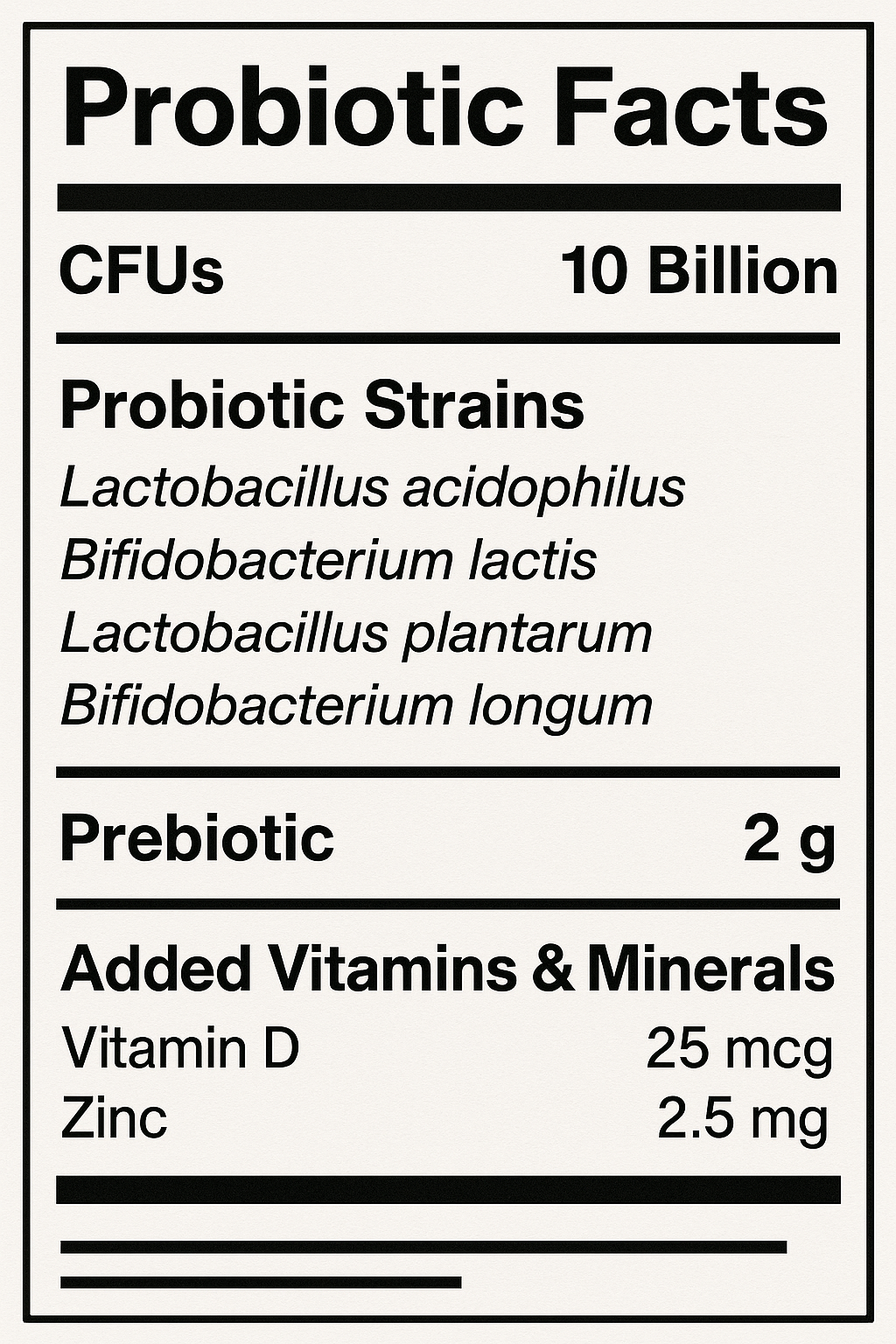
Probiotics for Bloating, Leaky Gut, and Inflammation
Certain strains, like Lactobacillus plantarum and Bifidobacterium infantis, help reduce intestinal inflammation and strengthen the gut lining, key for leaky gut syndrome relief. Supplements such as Jarrow Formulas Ideal Bowel Support and Klaire Labs Ther-Biotic Complete specifically target these issues.
Supporting the Gut-Brain Axis Through Select Strains
Emerging research highlights strains like Lactobacillus rhamnosus GG and Bifidobacterium longum in influencing mood and cognitive health through modulating the gut-brain axis.
Tailoring Probiotic Choices for Women’s Gut Health
Women’s health probiotics, such as Garden of Life Dr. Formulated Probiotics Once Daily Women’s and Bio-K+ Women’s Health, include strains supporting vaginal and urinary tract microbiota balance, along with digestive benefits.
Incorporating Probiotics into Daily Wellness Routines
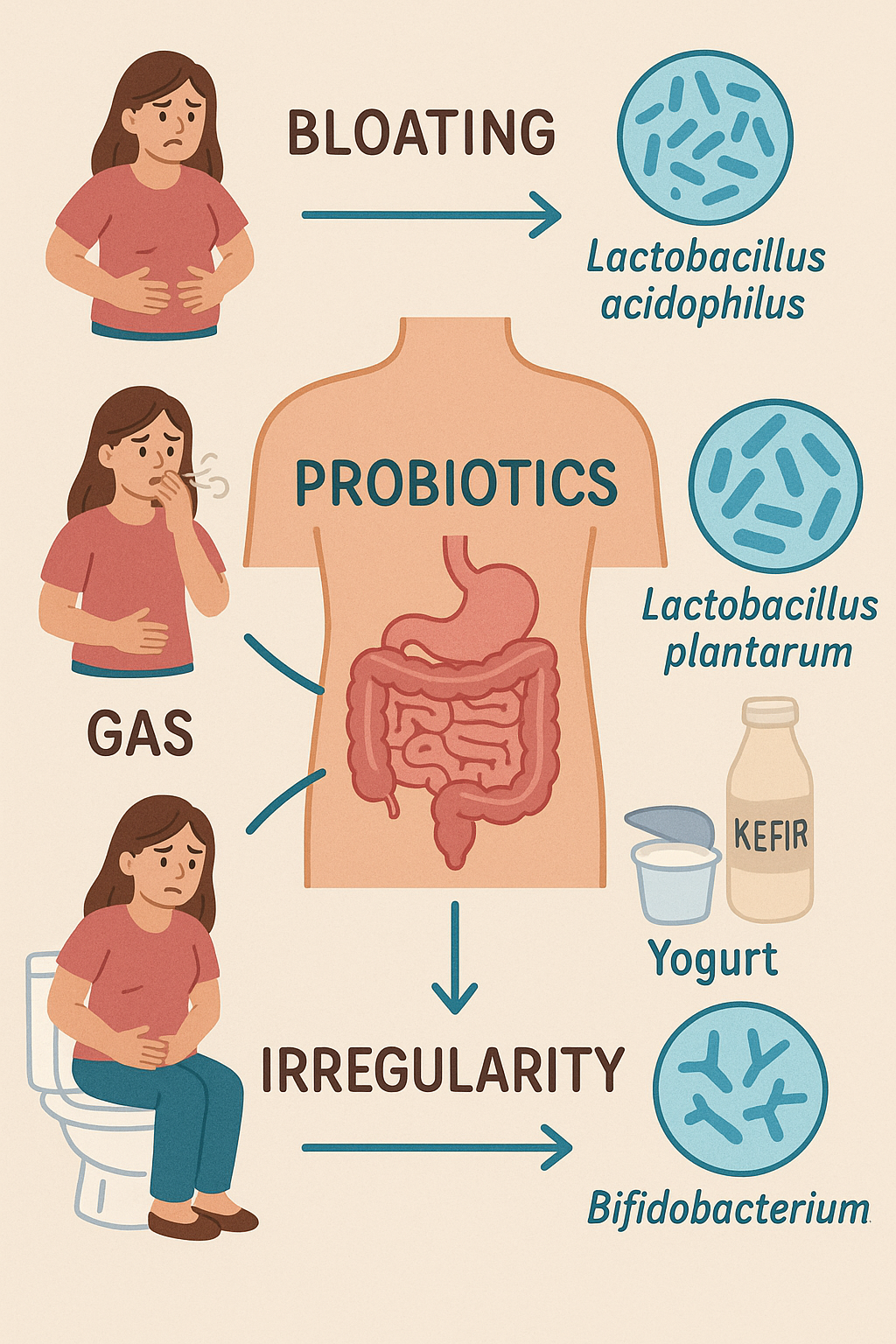
Combining Probiotics with Fermented Foods and Fiber
A synergistic approach enhances benefits—include fiber-rich foods like vegetables and whole grains, as well as fermented foods like kimchi, sauerkraut, or kefir to feed your gut bacteria and encourage diversity.
Understanding Probiotic Dosage and Timing
Taking probiotics with meals can enhance survival through stomach acid. Start with a lower dose if you’re new, gradually increasing as tolerated to minimize digestive discomfort.
Monitoring Effects and Adjusting Supplement Use
Keep a wellness journal to track digestive symptoms, mood changes, and overall energy. Adjust probiotic strains or doses based on your responses and consult professionals for persistent issues.
Unique Insights: The Emerging Role of Personalized Gut Microbiome Testing for Probiotic Selection
How Individual Microbiome Differences Affect Probiotic Efficacy
Everyone’s microbiome is unique, shaped by genetics, diet, environment, and medication history. Personalized microbiome testing can identify specific imbalances and guide targeted probiotic therapies for optimal outcomes.
Future Trends: Integrating Microbiome Analysis with Probiotic Supplementation
Current advances forecast a future where gut testing combined with AI will allow for customized probiotic blends, maximizing benefit and minimizing guesswork in gut health management.
Conclusion: Making an Informed Choice for Optimal Gut Health
Choosing the best probiotics for gut health is a vital step toward holistic wellness. With so many quality options—from Garden of Life’s women-specific formulas to Seed’s innovative synbiotics—you can find a product that fits your lifestyle, budget, and health goals. Remember, not all probiotics are alike, so pay close attention to strain diversity, CFU count, delivery technology, and ingredient transparency.
Before beginning any new supplement, I recommend consulting with a healthcare provider, especially if you have pre-existing health conditions or take medications. Combining probiotics with a balanced diet rich in fiber and fermented foods will further enhance your gut microbiome health.
By thoughtfully incorporating probiotics into your daily routine, you’re empowering your digestion, immune system, and even mental wellness. Your gut will thank you!
FAQs
1. What is the best probiotic for gut health and digestion?
The best probiotic combines clinically studied strains like Lactobacillus rhamnosus GG and Bifidobacterium lactis, sufficient CFU counts (10-50 billion), and prebiotics. Products like Culturelle Digestive Health and Renew Life Ultimate Flora are top picks.
2. How do prebiotics with probiotics improve gut health?
Prebiotics are fibers that feed probiotics and native gut bacteria, enhancing colonization and activity. Probiotics with prebiotics, called synbiotics, like Seed Daily Synbiotic, provide synergistic gut flora support.
3. Can probiotics help with bloating and leaky gut syndrome?
Yes. Specific strains, including Lactobacillus plantarum and Bifidobacterium infantis, reduce gut inflammation, improve barrier function, and alleviate bloating caused by digestive imbalances.
4. Are shelf-stable probiotics as effective as refrigerated ones?
Many shelf-stable probiotics use advanced delivery technologies to maintain viability without refrigeration. Always check storage instructions and expiration for potency assurance.
5. How should I take probiotics for maximum benefit?
Take probiotics daily, preferably with a meal to protect against stomach acid. Start with a recommended dose and adjust slowly based on tolerance. Consistency over time supports lasting gut health improvements.
Quick Takeaways
- Gut microbiome balance is essential for digestion, immunity, and mood.
- Probiotic strains and their CFU count are key to selecting effective supplements.
- Prebiotics and digestive enzymes enhance probiotic benefits.
- Shelf-stable and additive-free probiotics offer convenience and safety.
- The top 10 probiotics reviewed provide options tailored for women, general digestion, immune support, and sensitive users.
- Personalized microbiome testing is an emerging tool to optimize probiotic choices.
- Combining probiotics with diet and lifestyle changes yields the best gut health results.
Empower your wellness today by choosing a probiotic that suits your unique needs and supports a thriving gut microbiome. Your journey to better digestion, immunity, and vitality starts now!

